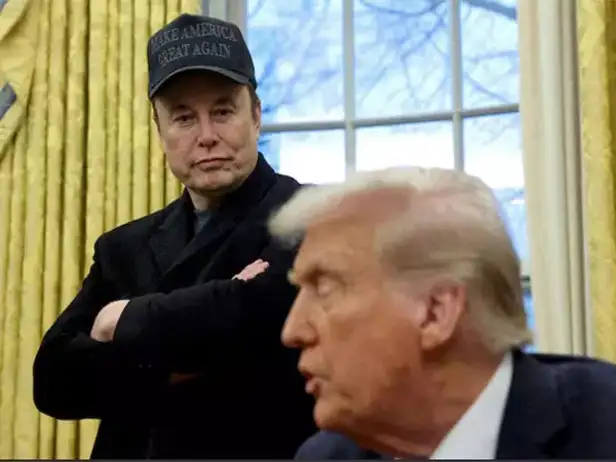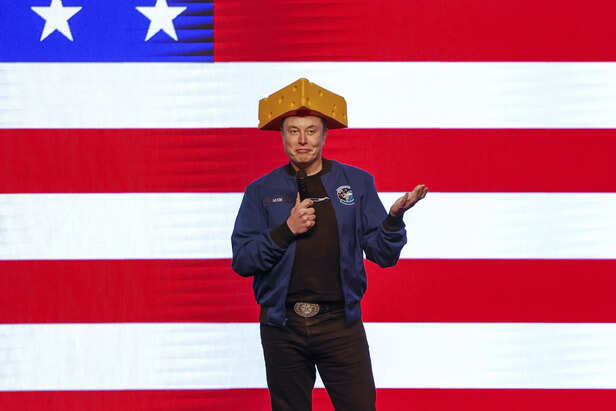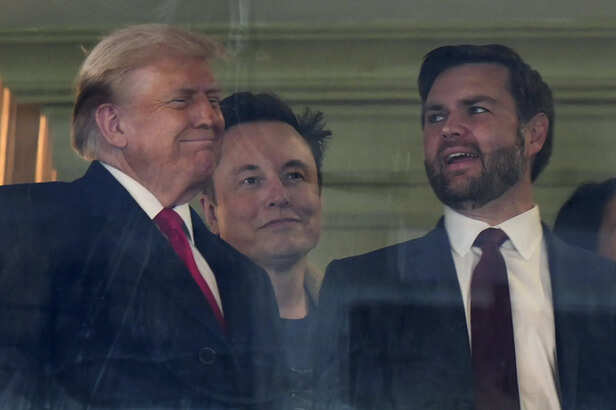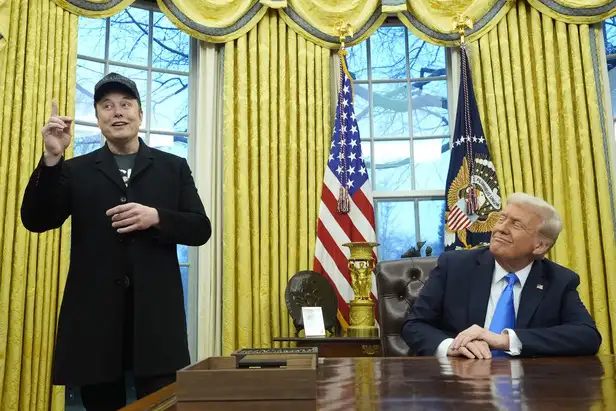Elon Musk Leaves Trump Administration After Criticizing ‘Big Beautiful Bill’
Ankit Gupta | May 31, 2025, 19:18 IST
( Image credit : AP, Timeslife )
Elon Musk has officially stepped down from his role as head of the Department of Government Efficiency (DOGE) in the Trump administration, following a six-month tenure marked by both collaboration and controversy. With his exit from the political arena, Musk plans to refocus on his primary ventures, Tesla and SpaceX, stating, "I think I've done enough."
“A bill can be big, or it can be beautiful—but it can’t be both.”
With that cutting remark, Elon Musk ended his brief yet high-profile tenure in the Donald Trump administration. The billionaire entrepreneur’s decision to step down from his government role, paired with a harsh critique of the administration’s signature legislation—the One Big Beautiful Bill Act (OBBBA)—has ignited widespread political debate, especially among fiscal conservatives.

In an era where political appointments often follow traditional party lines, Elon Musk’s induction as the head of the Department of Government Efficiency (DOGE) in late 2024 was a striking anomaly. Known globally for founding Tesla, SpaceX, Neuralink, and X (formerly Twitter), Musk brought with him not a background in public policy but a disruptive mindset and a no-nonsense attitude toward bureaucracy.
President Trump, during his second term, created DOGE as a symbolic and strategic attempt to appeal to libertarian-leaning voters and the tech-savvy youth. The department’s mission was clear: reduce federal waste, streamline government programs, and inject Silicon Valley-style innovation into Washington. Musk, with his fierce disdain for red tape and inefficiency, seemed like the perfect candidate—on paper.
In his initial press conference, Musk declared his intent to cut $2 trillion from the federal budget over a decade, targeting bloated agencies, obsolete programs, and excessive defense spending. He boasted of using AI to audit federal expenditures and blockchain to ensure financial transparency. But reality quickly proved more stubborn than a neural net.

The flashpoint that led to Musk’s exit was the One Big Beautiful Bill Act, a sweeping piece of legislation branded by Trump as the greatest economic overhaul since the 2017 Tax Cuts and Jobs Act. The bill combines aggressive tax reductions for corporations, substantial increases in defense spending, and reductions in green energy credits.
While Trump hailed it as a “historic win for the American economy,” critics, including Musk, viewed it as a contradiction of conservative principles. The bill is expected to add several trillion dollars to the national debt over the next decade, while doing little to curb wasteful spending. Even some within the GOP, such as Senators Ron Johnson and Mike Lee, voiced reservations.
Musk, in his resignation letter and subsequent interviews, called the bill a "monstrosity of contradictions", lamenting that while it gave lip service to efficiency, it was stuffed with “backroom deals, corporate subsidies, and needless bureaucracy.” In a particularly scathing comment during a CBS interview, Musk quipped:
“It’s like someone built a rocket with 50 engines and no guidance system. Looks powerful—but it’ll crash the moment it launches.”

Musk’s time in the Trump administration was not without friction. According to insiders, while Musk had regular one-on-one meetings with President Trump, he often clashed with White House Chief of Staff Stephen Miller, and Budget Director Jared Bernstein. His proposals to digitize all government paperwork, eliminate dozens of federal programs, and abolish the Department of Education met resistance not only from Democrats but also from entrenched Republican interests.
A particularly tense moment came during a cabinet meeting when Musk suggested that the Pentagon could “cut 30% of its budget and still function better than it does now.” This did not sit well with Trump loyalists, especially given that OBBBA allocated $150 billion in new defense spending.
Musk also became increasingly frustrated with the administration’s rejection of clean energy initiatives. As the OBBBA sought to scale back tax incentives for solar and electric vehicles, Musk—whose fortune and ideology are deeply tied to renewable energy—saw it as a personal and professional affront.

Musk formally resigned on May 28, 2025, and posted a succinct message on X:
“Thank you, Mr. President, for the opportunity. I’ve done my part. But a government built on debt isn’t one I can help make efficient. DOGE out.”
Within hours, hashtags like #DOGEOut, #MuskVsTrump, and #BigBeautifulBust began trending.
In a follow-up blog post, Musk elaborated on his decision:
“Government efficiency isn’t about slogans or stacking zeros onto defense contracts. It’s about doing more with less. We’re failing that principle. The ‘Big Beautiful Bill’ is not only fiscally irresponsible—it’s philosophically hollow.”
He ended the post with a quote attributed to Thomas Jefferson:
“To compel a man to furnish funds for the propagation of ideas he disbelieves is sinful and tyrannical.”
The Republican response was split. Hardline Trump supporters dismissed Musk as “never fully on board,” while fiscal conservatives praised him for standing by his principles. Democratic leaders, surprisingly, offered a few positive words.
Senator Elizabeth Warren, who has often criticized Musk’s corporate practices, remarked:
“While we disagree on many issues, I commend Mr. Musk for opposing irresponsible spending and standing against corporate welfare.”
In contrast, Marjorie Taylor Greene called Musk “a technocrat with too much ego” and accused him of “abandoning MAGA when it mattered most.”
Even President Trump, usually quick to lash out at former allies, responded with unexpected civility, saying:
“Elon’s a smart guy. Sometimes smart guys don’t get politics. But I thank him for his service. We’ll make America great—with or without the Space Man.”
With Musk gone, the future of the Department of Government Efficiency is uncertain. There are rumors that Trump may appoint Vivek Ramaswamy or Peter Thiel to take over, but neither has confirmed interest.
Some speculate that DOGE may be quietly dissolved, its budget redirected into the very programs Musk fought to eliminate. Others believe the department could pivot to focus more on government surveillance and data analytics—a direction Musk strongly opposed.
Free from the constraints of government service, Musk is turning his attention back to Tesla, which recently announced its new line of affordable AI-assisted electric scooters, and SpaceX, which is preparing for its first crewed Mars simulation habitat launch.
He also hinted at a “TruthGPT 2.0”—a successor to his controversial AI project aimed at providing “unbiased” public information. Whether this will be a reentry into the political discourse or another tech experiment remains to be seen.
When asked if he would ever return to politics, Musk responded with a chuckle:
“I learned more about entropy in Washington than I did building rockets. So… probably not.”
Musk’s departure and his criticism of OBBBA reignite a longstanding American debate: Can government ever be truly efficient under a capitalist democracy that rewards lobbying, subsidies, and expansion?
While Musk believed that technology could fix inefficiency, others argue that the problem is political will, not logistics. As one critic put it, “You can’t automate values.”
The One Big Beautiful Bill, while packaged as economic reform, has laid bare the ideological schisms within the Republican Party—between Trumpist populism, libertarian minimalism, and corporate capitalism.
Elon Musk’s foray into Washington was brief, bold, and ultimately, unsustainable. He brought with him a futurist’s optimism and a billionaire’s impatience. His resignation is more than just the exit of a celebrity appointee—it is a symbolic rejection of politics as usual.
By standing against the very bill that the Trump administration pinned its hopes on, Musk has carved out a rare space: a businessman who entered government not for power, but to question power.
Whether history remembers him as a failed reformer or a principled outsider may depend on how America’s fiscal future unfolds. But one thing is certain: Elon Musk, even when departing, doesn’t go quietly.
With that cutting remark, Elon Musk ended his brief yet high-profile tenure in the Donald Trump administration. The billionaire entrepreneur’s decision to step down from his government role, paired with a harsh critique of the administration’s signature legislation—the One Big Beautiful Bill Act (OBBBA)—has ignited widespread political debate, especially among fiscal conservatives.
Musk’s Unexpected Government Foray

The DOGE Era
( Image credit : ANI )
In an era where political appointments often follow traditional party lines, Elon Musk’s induction as the head of the Department of Government Efficiency (DOGE) in late 2024 was a striking anomaly. Known globally for founding Tesla, SpaceX, Neuralink, and X (formerly Twitter), Musk brought with him not a background in public policy but a disruptive mindset and a no-nonsense attitude toward bureaucracy.
President Trump, during his second term, created DOGE as a symbolic and strategic attempt to appeal to libertarian-leaning voters and the tech-savvy youth. The department’s mission was clear: reduce federal waste, streamline government programs, and inject Silicon Valley-style innovation into Washington. Musk, with his fierce disdain for red tape and inefficiency, seemed like the perfect candidate—on paper.
In his initial press conference, Musk declared his intent to cut $2 trillion from the federal budget over a decade, targeting bloated agencies, obsolete programs, and excessive defense spending. He boasted of using AI to audit federal expenditures and blockchain to ensure financial transparency. But reality quickly proved more stubborn than a neural net.
A Budget or a Burden?

The Big Beautiful Bill
( Image credit : AP )
The flashpoint that led to Musk’s exit was the One Big Beautiful Bill Act, a sweeping piece of legislation branded by Trump as the greatest economic overhaul since the 2017 Tax Cuts and Jobs Act. The bill combines aggressive tax reductions for corporations, substantial increases in defense spending, and reductions in green energy credits.
While Trump hailed it as a “historic win for the American economy,” critics, including Musk, viewed it as a contradiction of conservative principles. The bill is expected to add several trillion dollars to the national debt over the next decade, while doing little to curb wasteful spending. Even some within the GOP, such as Senators Ron Johnson and Mike Lee, voiced reservations.
Musk, in his resignation letter and subsequent interviews, called the bill a "monstrosity of contradictions", lamenting that while it gave lip service to efficiency, it was stuffed with “backroom deals, corporate subsidies, and needless bureaucracy.” In a particularly scathing comment during a CBS interview, Musk quipped:
“It’s like someone built a rocket with 50 engines and no guidance system. Looks powerful—but it’ll crash the moment it launches.”
Friction Within the Administration

Failure of DOGE
( Image credit : AP )
Musk’s time in the Trump administration was not without friction. According to insiders, while Musk had regular one-on-one meetings with President Trump, he often clashed with White House Chief of Staff Stephen Miller, and Budget Director Jared Bernstein. His proposals to digitize all government paperwork, eliminate dozens of federal programs, and abolish the Department of Education met resistance not only from Democrats but also from entrenched Republican interests.
A particularly tense moment came during a cabinet meeting when Musk suggested that the Pentagon could “cut 30% of its budget and still function better than it does now.” This did not sit well with Trump loyalists, especially given that OBBBA allocated $150 billion in new defense spending.
Musk also became increasingly frustrated with the administration’s rejection of clean energy initiatives. As the OBBBA sought to scale back tax incentives for solar and electric vehicles, Musk—whose fortune and ideology are deeply tied to renewable energy—saw it as a personal and professional affront.
Departure and Final Words

Elon Musk leaves the White House after a turbulent effort to slash the government
( Image credit : AP )
Musk formally resigned on May 28, 2025, and posted a succinct message on X:
“Thank you, Mr. President, for the opportunity. I’ve done my part. But a government built on debt isn’t one I can help make efficient. DOGE out.”
Within hours, hashtags like #DOGEOut, #MuskVsTrump, and #BigBeautifulBust began trending.
In a follow-up blog post, Musk elaborated on his decision:
“Government efficiency isn’t about slogans or stacking zeros onto defense contracts. It’s about doing more with less. We’re failing that principle. The ‘Big Beautiful Bill’ is not only fiscally irresponsible—it’s philosophically hollow.”
He ended the post with a quote attributed to Thomas Jefferson:
“To compel a man to furnish funds for the propagation of ideas he disbelieves is sinful and tyrannical.”
Mixed Political Reactions
Senator Elizabeth Warren, who has often criticized Musk’s corporate practices, remarked:
“While we disagree on many issues, I commend Mr. Musk for opposing irresponsible spending and standing against corporate welfare.”
In contrast, Marjorie Taylor Greene called Musk “a technocrat with too much ego” and accused him of “abandoning MAGA when it mattered most.”
Even President Trump, usually quick to lash out at former allies, responded with unexpected civility, saying:
“Elon’s a smart guy. Sometimes smart guys don’t get politics. But I thank him for his service. We’ll make America great—with or without the Space Man.”
What Now for DOGE?
Some speculate that DOGE may be quietly dissolved, its budget redirected into the very programs Musk fought to eliminate. Others believe the department could pivot to focus more on government surveillance and data analytics—a direction Musk strongly opposed.
What Now for Musk?
He also hinted at a “TruthGPT 2.0”—a successor to his controversial AI project aimed at providing “unbiased” public information. Whether this will be a reentry into the political discourse or another tech experiment remains to be seen.
When asked if he would ever return to politics, Musk responded with a chuckle:
“I learned more about entropy in Washington than I did building rockets. So… probably not.”
The Larger Debate: Efficiency vs. Ideology
While Musk believed that technology could fix inefficiency, others argue that the problem is political will, not logistics. As one critic put it, “You can’t automate values.”
The One Big Beautiful Bill, while packaged as economic reform, has laid bare the ideological schisms within the Republican Party—between Trumpist populism, libertarian minimalism, and corporate capitalism.
Final Thoughts
By standing against the very bill that the Trump administration pinned its hopes on, Musk has carved out a rare space: a businessman who entered government not for power, but to question power.
Whether history remembers him as a failed reformer or a principled outsider may depend on how America’s fiscal future unfolds. But one thing is certain: Elon Musk, even when departing, doesn’t go quietly.
